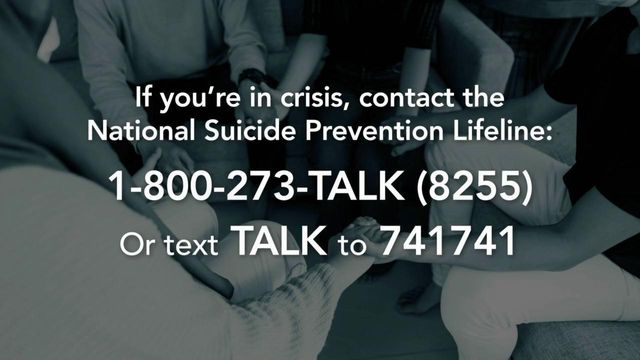As suicide rate increases, therapist shares ways to help yourself and others in emotional crisis
A streak of near-perfect weather in central North Carolina is a big driver to get outside, which is good for not only physical health, but also mental health.
Mental health has been in the spotlight as National Suicide Prevention Awareness month closes out.
Overall, the suicide rate in the U.S. has increased by 35 percent over the last 20 years, according to the National Alliance on Mental Illness.
Jeanie Chang, the founder of Your Change Provider PLLC, said isolation plays a major role in suicide.
“Folks that are overwhelmed, whether it’s financial distress from COVID [or] feeling lonely, regardless of age. I can think of college students and up,” said Chang
Chang, who is a licensed family therapist, said she's recently seen an increase in patients having suicidal thoughts.
Just last year, Chang said, one of her former patients died from suicide.
“Honestly, I would have said in my own clinical expertise that he was doing great,” she said.
The U.S. Centers for Disease Control and Prevention published data in June that emergency department visits for suspected suicide attempts increased in May among those ages 12 to 17, especially girls.
Chang attributed the increase in suicidal thoughts to three things: the pandemic, racism and the 20th anniversary of 9/11.
"Everything that 9/11 brought with it, I think hit people a lot more this particular year because we're so much more vulnerable because of COVID, and then what we've experienced in the last 18 months with political strife, economic strife and stress," said Chang.
CDC research also showed that mental health-related emergency room visits among those ages 12 to 17 were up 31 percent in 2020 compared to data from the previous year.
Chang said the tricky part is, someone who is having suicidal thoughts may seem fine.
If you think someone needs help, Chang said the best thing to do is share and ask.
"For instance, saying, 'You know, I've been really stressed out, or this has been super hard. How about you?’ That may open up the conversation," suggested Chang.
The National Institute of Mental Health says there are steps you can take to help someone in emotional pain:
- Ask "Are you thinking about killing yourself?"
- Keep the person safe by reducing their access to highly lethal items or places.
- Be there for the person by listening carefully, and learn what the person is thinking and feeling
- Help them connect to the National Suicide Prevention Lifeline at 1-800-723-TALK(8255) and the Crisis Prevention Text Line number at 741741.
- Help make a connection with a trusted person like a family member, fiend, spiritual advisor or mental health professional.
- If a mental health crisis happens, stay in contact with the person afterward or after being discharged from care.
Chang said that social media can also be helpful in this cause, because if you're feeling alone and have no one to talk to, there are several Facebook groups with people also dealing with similar situations.












